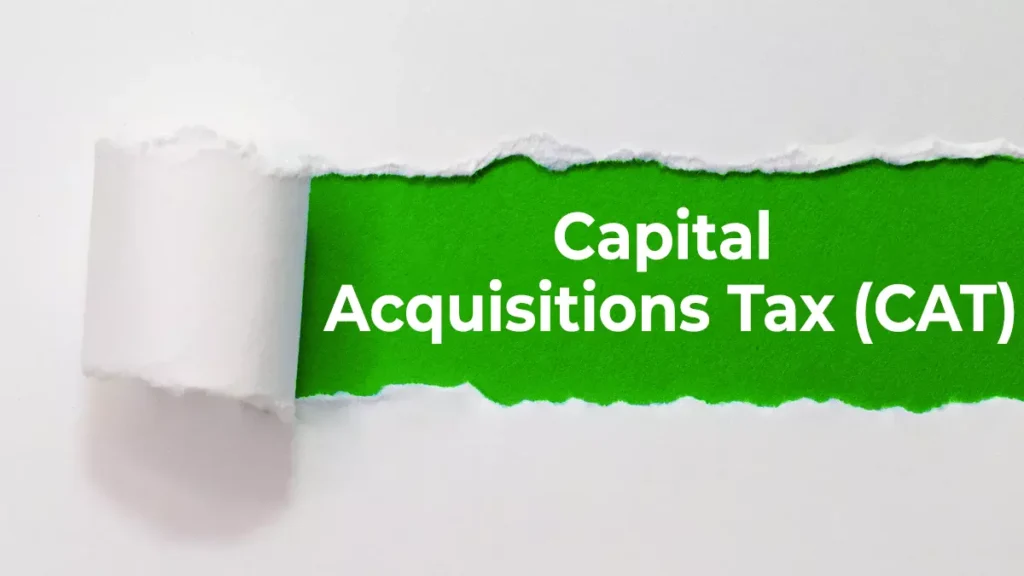
Tax Tips on Capital Acquisitions Tax (CAT) / Gift and Inheritance Tax
Introduction
Capital Acquisitions Tax (CAT) is a tax on gifts and inheritances. You may receive gifts and inheritances up to a set value over your lifetime before having to pay CAT. Once due, it is charged at the current rate of 33%.
You can get a certain amount of gifts and inheritances without paying CAT. The person who gives you the gift or inheritance is called the disponer, and the person who receives the gift or inheritance is called the beneficiary. Gifts become inheritances if the disponer dies within two years of giving the gift.
The amount of gifts and inheritances you can get without paying CAT depends on your relationship with the person you get them from. Relationships are grouped into three categories with different tax-free limits. Each limit applies to the total of all the gifts and inheritances you get from people in that category.
CAT applies to all properties located in Ireland. It also applies if the property is not located in Ireland but the person giving or receiving it is resident or ordinarily resident in Ireland for tax purposes.
There are tax reliefs and exemptions for some types of gift or inheritance. For example, if you get a gift or inheritance from your spouse or civil partner, it is exempt from CAT. There is also an exemption for gifts of up to €3,000 a year that you get from the same person. Read more about Capital Acquisitions Tax exemptions and reliefs.
Items Regarded as a Gift or Inheritance Include:
- Cash
- House or lands
- Household contents
- Paintings
- Jewellery
- Cars
- Stocks and shares
- Free use of property and interest-free loans
- A limited interest or a right of residence in a property
- A benefit received out of a discretionary trust
- A further share in jointly held property that you inherited from another joint owner
Transfers Between Spouses or Civil Partners
If you receive a gift or an inheritance from your spouse or civil partner, that gift or inheritance is exempt from Capital Acquisitions Tax. For more details, please see MABS.
Inheritance and Gift Tax Groups and Group Thresholds
You do not pay tax on a gift or inheritance if its taxable value is below a particular threshold. The threshold you use depends on your relationship to the disponer. You must pay tax on any remaining value above that threshold. There are three group thresholds.
Group A
The Group A threshold applies to gifts or inheritances a child gets from their parent. ‘Child’ includes the adult child of a parent, a stepchild, and an adopted child. Group A applies if you are the child of the person who gives you the benefit or their civil partner. Group A also applies when you get an inheritance from your child if you get full ownership of the inheritance. If you inherit a limited interest or get a gift, then Group B applies. You may be exempt from CAT on an inheritance from your child if, in the previous five years, your child took a gift or inheritance from either parent and it was not exempt from CAT. It does not have to be the same property or of the same value. In this case, no tax needs to be paid even if the inheritance from the child is over the threshold.
Group B
Group B applies if you get a gift or inheritance from someone and you are their parent and you get a gift or a limited interest, brother or sister (sibling), sibling’s child (or you are the child of their sibling’s civil partner), grandparent or great-grandparent, grandchild or great-grandchild. If a grandchild is under 18 years of age and takes a gift or inheritance from their grandparent, Group A may apply if the grandchild’s parent is deceased.
Group C
Group C applies to any relationship not included in Group A or Group B.
Inheritance and Gift Tax Group Thresholds
Each group has a tax-free threshold amount. The threshold is cumulative and applies to the total taxable benefits you have received in that group. You only pay tax on the value of a gift or inheritance above the tax-free group threshold amount.
Group | Limit |
A | €335,000 |
B | €32,500 |
C | €16,250 |
Inheritance and Gift Tax Rates
The standard rate of Capital Acquisitions Tax (CAT) for gifts and inheritances received on or after 6 December 2012 is 33%.
Tips for Managing Capital Acquisitions Tax
Tip 1: Small Gift Exemption
Gifts you receive up to the value of €3,000 from any person in a calendar year are exempt from CAT. This means that you may take a gift from several people in the same calendar year, and the first €3,000 from each disponer is exempt from CAT. Gifts of €3,000, as outlined above, are not taken into account in computing tax and are not included for aggregation purposes. This small gift exemption applies only to gifts and not to inheritances. A CAT Return is not required to claim the Small Gift Exemption for annual gifts of up to €3,000. A CAT Return is only required when the taxable value of the gift exceeds 80% of the relevant group threshold. All prior taxable gifts and inheritances, received within the same group threshold since 5 December 1991, should be included in this calculation. The taxable value of the gift is then reduced by the €3,000 small gift exemption. If required to file, you can claim the Small Gift Exemption by filing a CAT return Form IT38 online. This can be found at ROS. You can also file a paper Form IT38S in certain circumstances.
Tip 2: Date of Inheritance
The date of a gift is normally the date it is received. The date of an inheritance is usually the date of death of the person leaving the inheritance. These dates determine the Capital Acquisitions Tax (CAT) rates and the group threshold that apply.
Tip 3: Valuation Date
The valuation date is the date on which the value of the property and assets is established. It determines which date the tax is payable and your CAT returns are due to be filed.
Tip 4: What is the Valuation Date?
The valuation date is the date on which the market value of a gift or inheritance is established. The market value is the best price you would get if you sold the item on the open market. The valuation date also determines the date by which a return must be filed and tax must be paid. The valuation date for a gift is generally the date you receive it. The valuation date for an inheritance is the earliest of the following dates:
- The date the executor or administrator is entitled to retain the asset for your benefit
- The date on which the asset is retained
- The date the executor or administrator gives the asset to you
Tip 5: Filing and Paying Capital Acquisitions Tax
You can file your return online through ROS or by completing a paper return known as a Form IT38S. You can pay your CAT online, with a debit or credit card, or by Electronic Funds Transfer. If the valuation date falls between 1 January and 31 August, you must pay by 31 October of that year. If it falls between 1 September and 31 December, you must pay by 31 October of the following year.
Conclusion
The tax liability an individual may be obliged to pay for a gift or inheritance is greatly determined by their relationship to the person they receive the gift or inheritance from. Any such tax liability arising from such an event has very stringent rules for the filing and payment of Capital Acquisitions Tax. Individuals should make themselves fully aware of their entitlements and obligations relating to such gifts and inheritances and should engage the services of a professional where they believe this is necessary.
Contacts
For further advice and information, contact:
- Anytime Tax Refunds Limited
- Contact Us
- Phone: 071-9328980, 087-6641455
- Email: mailto:info@anytimetaxrefunds.ie
- Revenue: Revenue Capital Acquisitions Tax (CAT) thresholds, rates and aggregation rules
- Citizens Information: Capital Acquisitions Tax
- Legal Aid Board: legalboard.ie
- Department of Enterprise Trade and Employment: enterprise.gov.ie
- Money Advice and Budgeting Service: mabs.ie
More Tax Tips

Working from Home Tax Relief Tips 2024
Working from home, also known as remote working or e-working, can make you eligible for working from home tax relief.

Tax Tips on Maintenance Payments in Ireland
Learn all about maintenance payments in Ireland, including tax implications, legal requirements, and practical tips for both payers and recipients.

Essential Guide to Claiming Medical Expenses
Medical expenses can significantly impact your finances, but understanding the tax relief available can alleviate some of the financial burden.

5 Little-Known Tax Reliefs for Parents in 2024
In Ireland, numerous families are entitled to various tax benefits, yet a significant number of parents and guardians miss out on claiming tax relief each